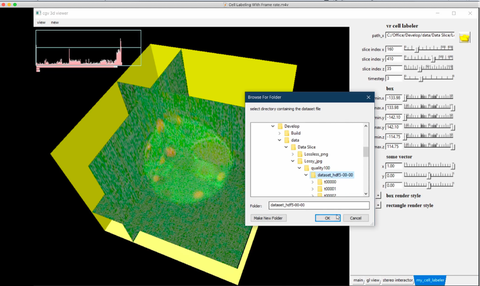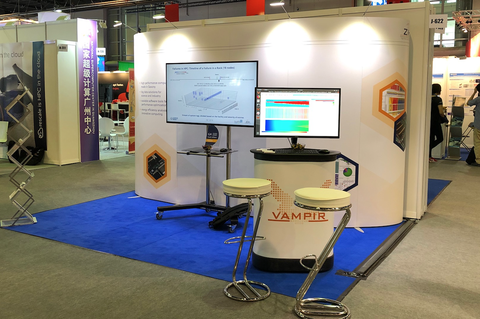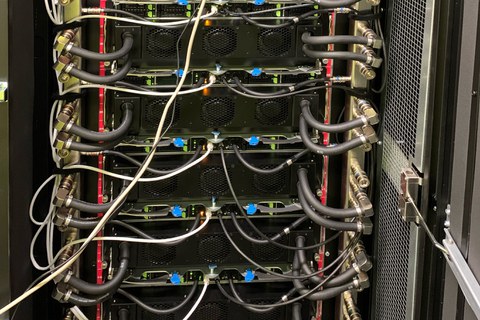Jun 29, 2021
ZIH@ISC2021 - With real Alpha Centauri Ranking, virtual booth and inspiring Presentations
Ranked 182nd in the Top500 list for the "Alpha Centauri" cluster
In the Top500 spring list of the world's fastest supercomputers, traditionally published at ISC High Performance (ISC), “Alpha Centauri” at the Center for Information Services and High Performance Computing (ZIH) at TU Dresden reached place 182 (17th place among the systems in Germany). The special about this ranking is that our cluster with its only 34 very powerful compute nodes made it into the current list. In addition to pure computing power, the focus of this expansion was primarily on meeting the very specific requirements of users in the field of artificial intelligence (AI) and machine learning (ML). In the Green500 list - the ranking according to energy efficiency, i.e. the number of calculation per watt - the system reached the 18th rank in a global comparison.
At the heart of the system and essential for the computing power are a total of 272 NVIDIA A100 GPUs, eight of which are contained in each compute node. Their theoretical maximum performance of floating-point operations is more than 2.6 PFlop/s at 64-bit (double precision), more than 5.3 PFlop/s at 32-bit (single precision), and more than 42 PFlop/s in FT32-to-FP32 Tensor Operations. Each node also features a large 1 TB of main memory and 3.2 TB of local NVMe cache to quickly feed data to the GPUs. Fast connectivity to the central HPC storage complex is provided via two HDR InfiniBand ports each with a combined 400 Gbps of network bandwidth at a very low latency. The maximum power consumption of a node is 4.8 kW. Direct hot water cooling (DLC) ensures high energy efficiency while utilizing the waste heat.
The cluster was provided by NEC Deutschland GmbH and taken into operation at the end of February. ZIH operates the system in particular for the AI and ML applications from the Big Data and AI Competence Center ScaDS.AI Dresden/Leipzig. However, free capacities are available to research beyond this throughout Germany within the framework of National High-Performance Computing (NHR), for which ZIH has been funded by the federal government and the Free State of Saxony as one of eight locations since January 2021.
"In view of the HPC and analysis needs in more and more scientific application areas – but especially due to the expected growth in terms of data volume and complexity of the applications – we have to continuously increase the performance of our computing infrastructure with the help of the latest technologies and thereby rethink the design of the computer architecture again and again. With the requirements of our AI competence center ScaDS.AI and the close cooperation with our HPC experts, with permanent direct feedback from the various disciplines, the challenge then remains to efficiently exploit the performance of these systems through appropriate methods", resumes Prof. Wolfgang E. Nagel, as head of ZIH and scientific spokesperson of ScaDS.AI with regard to the current Top500 ranking.
The new computing cluster has been integrated into the existing powerful HPC infrastructure of the ZIH. In addition to the specialized HPC resources, we offer our users individual support and comprehensive consulting in order to use the systems efficiently for scientific research. Our education program is currently being widely expanded in close coordination with the other NHR sites. Dedicated formats are being developed for the ZIH methodological focus areas of Big Data, Data Analysis and Management, Machine Learning, Tiered Storage Architectures and I/O Optimization, as well as Performance and Energy Efficiency Analysis and Optimization.

3D microscopy allows to understand dynamic cell and tissue formation process but data is typically very noisy and machine learning based tracking approach needs a lot of ground truth. (Screenshot)
ZIH presents itself with virtual booth and scientific contributions
This very real Top500 placement allows ZIH to round up virtual booth presence at this year's ISC. At the virtual booth, we present a broad spectrum of our current work in the areas of High Performance Computing, Machine Learning and High Performance Data Analytics. This will be complemented in the scientific program by numerous virtual conference presentations on the main topics of our research ranging from AI, Machine Learning and Data Analytics to performance analysis of HPC applications, the demonstration of the performance tools we have developed, and an LLVM compiler workshop.
As HPC competence center, ZIH offers specialized computing resources as well as individual support and consulting for its users. The system will primarily be available for AI research of the competence center ScaDS.AI Dresden/Leipzig. The execution of highly parallel applications that use AI methods for fast data analysis will benefit from this efficient system, driving both model development and expressiveness of analyses.
Virtual booth presence:
https://booth.zih.tu-dresden.de
ZIH contributions to the scientific conference program
- "Hands-on Practical Hybrid Parallel Application Performance Engineering“, Tutorial by Bill Williams (ZIH) on June, 24.
- "Guidelines for HPC data center monitoring and analytics framework development“, BoF-Session, Thomas Ilsche (ZIH) on June, 30.
- „Performance Analysis for new HPC programming models”, Andreas Knüpfer (ZIH) on July, 1.
- „4th HPC Applications in Precision Medicine Workshop", Andreas Deutsch (ZIH) on July, 2.
- "Machine Learning on HPC Systems“, Workshop, Sunna Torge and Peter Winkler (ZIH) and Nico Hoffmann (TU Dresden) on July, 2.
- „LLVM-CTH: The Second Workshop on LLVM Compiler and Tools for HPC“, Anja Gerbes (ZIH) on July, 2.
About TU Dresden
TU Dresden is one of the largest technical universities in Germany with more than 31 000 students. It has a history of over 190 years. Its wide range of disciplines, unique in Germany, obligates the university to promote interdisciplinarity and to contribute to the integration of science into society. Information Technology is among its five research priority areas. Since 2012, the TUD is one of the eleven Excellence Initiative universities in Germany.
About ZIH
ZIH is the university IT center of TU Dresden and the High Performance Computing (HPC) competence center for TU Dresden and the state of Saxony for over 20 years. Since the beginning of 2021, ZIH is one of eight NHR centers in the initiative “Nationales Hochleistungsrechnen” of the national Joint Science Conference (GWK) and the German Research Foundation (DFG) and thus offers its services to academic users from all over Germany.
About ScaDS.AI Dresden/Leipzig
ScaDS.AI (Center for Scalable Analytics and Artificial Intelligence) Dresden/Leipzig extends the national competence center for Big Data, ScaDS, established in 2014. Its research bridges the gap between innovative methods of advanced AI and the efficient use and evaluation of mass data. In doing so, ScaDS.AI focuses on new methods for machine learning, knowledge management and the efficient handling of data. Furthermore, it develops service-oriented solutions and cooperates with a variety of application partners from science and industry.


